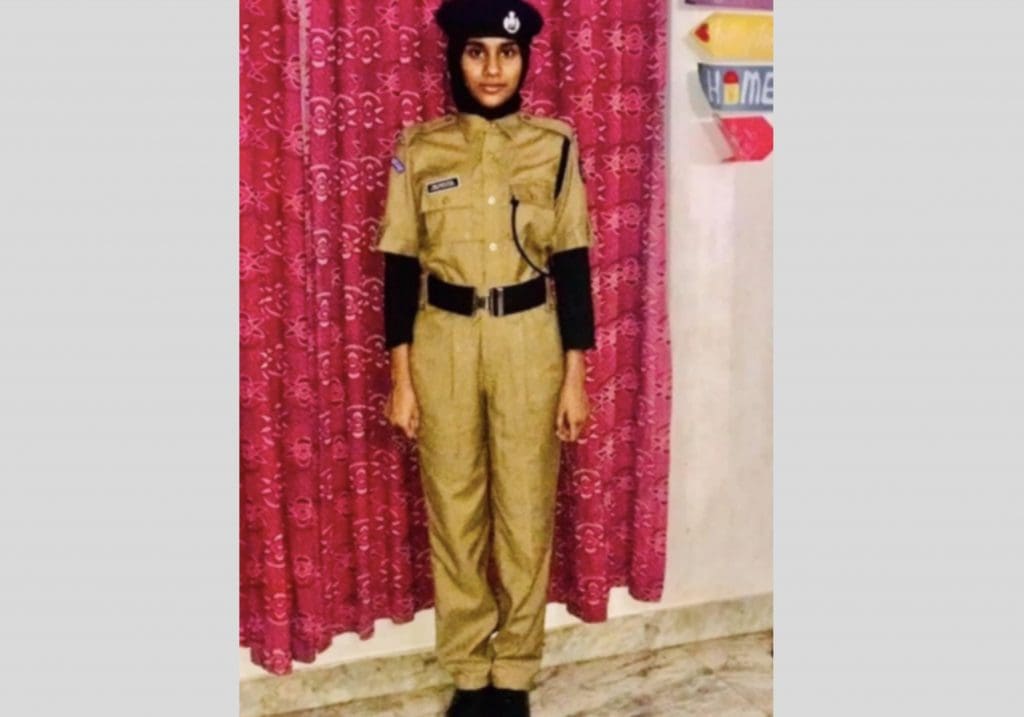
Kerala government has said in an order that headscarves and full sleeves cannot be allowed in Student Police Cadet (SPC) uniform on Thursday, observing that it affects secularism and discipline of the police force.
The order came following the petition of Riza Nahan, an 8th standard student of GHSS Kuttiyadi in Kozhikode district, after she was asked to remove headscarf in SPC uniform by her teachers. Though the petitioner had approached Kerala High Court initially, it was redirected to the Home Department of Kerala for the further developments.
Stating that SPC is an initiative of the Kerala Police, implemented jointly by the Departments of Home and Education, the government order said, “uniform should be beyond any religious mark.”
However, when Riza Nahan pointed out Sikh communities are permitted to wear turbans and keep beards since it is a matter of their essential religious practice, during the online hearing with the Superintend Police and Additional State Nodal officer on 10 December, they had failed to respond to Nahan’s queries.
“Not every religious practice is an essential religious practice. Muslim men keeping beard is a religious practice and not essential,” says advocate Ameen Hassan.
However, headscarf has been established as an essential religious practice by the Kerala High Court in Amnah Bint Basheer vs CBSE case back in 2015, when the petitioner was not allowed to wear headscarf during examination.
“The Student Police Cadet is a voluntary co-curricular activity and not a mandatory or compulsory education programme,” reads the order.
“This is outrightly outcasting Muslim girls. It is discriminatory as even when a Muslim girl qualifies academically and physically for SPC, she is asked to stay away for practicing her religion,” pointed out Hassan.
“We hoped for an order that recognises and includes Muslim women. Since the government order was not positive, we will go to court,” Riza Nahan said to Maktoob.
“Out of 20 students (in her school), only two Muslim girls have joined SPC. Most of the Muslim girls don’t join SPC, solely because the uniform does not allow headscarf,” Nahan, who dreams of becoming a police officer someday, earlier told Maktoob.
Though Article 25 of the Constitution provides the fundamental right to practice one’s religion, Article19 (2) allows the State to impose reasonable restrictions on the same. However, the reasons cited for restricting hijab from the SPC uniform in the order are that the dress code of the Police force is in accordance with gender neutrality and non-religious, non-racial secular ideals.
“If this is an attempt to remove all visible religious identity, then even name plates must be done away,” pointed out Ameen Hassan.
Indian names mention not only religion, but also caste.
“Moreover, when judges and parliamentarians can easily wear their religion, why is it only the police that has the extra burden of secularism,” asked the lawyer.
Riza Nahan in several instances was pressured to withdraw the case by SPC nodal officers and government.
“Indian courts usually catch up with the international standards of law legislation. Decriminalisation of Section377 was one such move. When western world is moving towards inclusive secularism, Indian courts need to rethink their take on secularism,” says Ameen Hassan.
The case in court will be heard on the merit of the right to essential religious practice and the right of the state to impose reasonable restrictions.



